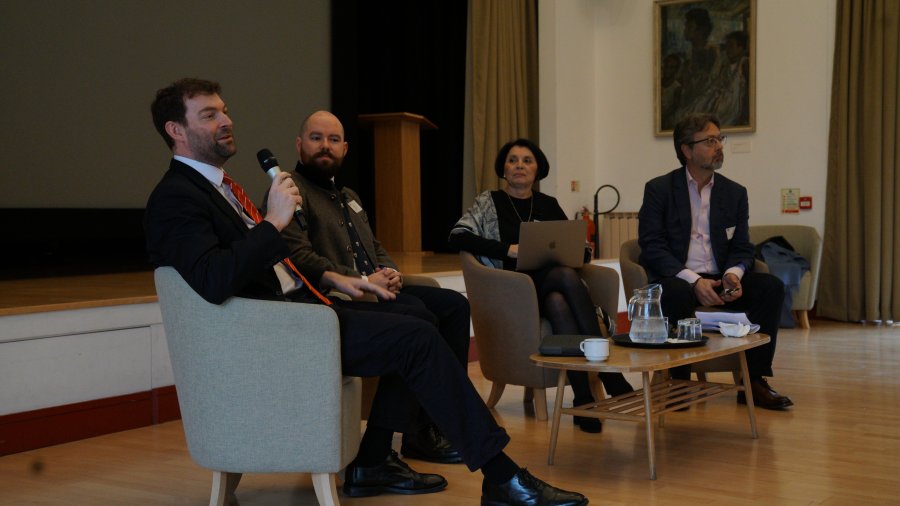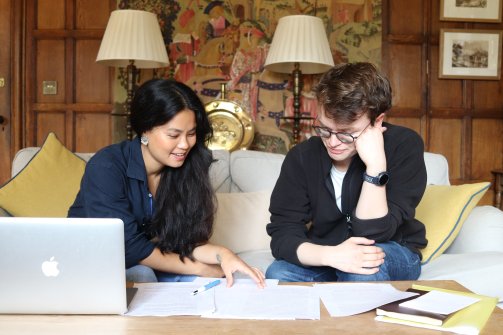The politics of time with Carolyn Smith


This year’s Wolfson Alumni Law Event highlighted the strength of the College’s tradition of Law study.

Organised by the Wolfson Sir David Williams Law Society, the event brought together Wolfson Law and Criminology alumni, students, and others who work in law for a day of panel discussions, tours, and a formal dinner.
The International Law panel was chaired by Wolfson Fellow, Dr Jamie Trinidad KC, (m.2007), and the Crime and Constitution panel was led by Professor Dame Sara Thornton DBE QPM, (m.2010).
In this event recap, Jan-Henrik Hinselmann, PhD researcher at the Lauterpacht Centre, and Richard Danbury, Wolfson Visiting Fellow and Research Fellow at the Faculty of Law, look back on the highly successful event:
"Modern day slavery, rape trials in India, how AI should be used in policing – that was all before the cake and coffee.
Saturday 18 February saw a fascinating afternoon for Wolfson’s lawyers, past and present. The cake was followed by presentations on the regulation in regional law of international supply chains, international human rights law, and how international arbitration can help deal with issues such as climate change.
The day was an opportunity to display the depth and breadth of Wolfson’s legal expertise, and how Wolfson’s lawyers are wrestling with significant problems in jurisdictions across the globe.
It was organised by current students, who recruited an impressive cast.
The first session – on Crime and the Constitution- was chaired by Professor Dame Sara Thornton DBE QPM, (m.2010) who moderated presentations from and discussions between Emeritus Fellow, Dr Jennifer Davis and Fellow Dr Arushi Garg.
The second session, on international law, was chaired by Wolfson Fellow, Dr Jamie Trinidad KC (m.2007) with Ioannis Alexopoulos (m.1985); Dr Markus Beham (m.2019); and Professor Photini Pazartzis (m.1997).
The crime and constitution session first: Dame Sara Thornton drew on just a small section of her extensive experience. She talked about the legal responses to modern day slavery – including how the opacity of the Home Office was a great impediment to understanding the issue; and how to really get the private sector’s attention to help sort it out.
Dr Garg took her audience through a post-colonial, feminist analysis of the efficacy of rape prosecutions in India, describing (amongst other things) how some non-legal resolution mechanisms can complement – and can undermine – it.
Dr Davis told the audience about how Artificial Intelligence was being used to help policing – but pointed out some legal, ethical and practical problems. She noted how the rights of individual data subjects risked being overlooked when focusing on the general public interest; how there was an ethical imperative to treat people as ends not means; and how AI data can have subjective biases built in, masquerading as objective fact.
After the break, the meeting turned its attention to international law. Dr Markus Beham started, picking up a thread laid down by Dame Sara, who had talked about the importance of regulating supply chains in dealing with the problems of modern slavery.
Dr Beham identified an intriguing new showcase of how to fulfil the promises of international human rights law for those most vulnerable individuals in today's globalized economy. That is, by way of "incorporation" of international legal standards into domestic legislation regulating supply chains. These efforts are gaining traction across jurisdictions and in particular in industrial state, including most recently the European Union.
Next, Professor Photini (Fay) Pazartzis shared some of her vast experiences on the UN Human Rights Committee in order to broach the more general question of the merits of litigation for the particular purposes of climate change mitigation.
Finally, Ioannis Alexopoulos, tried to persuade the audience that even the “private justice” that is sought in international commercial arbitration can indeed be practiced in a way that serves, or at least appreciates, the greater good of the public at large."
To find out more about studying Law at Wolfson College, check out our Law subject page.
Watch out for more law events this year, organised by the Alumni Office and the student-led Sir David Williams Law Society.







